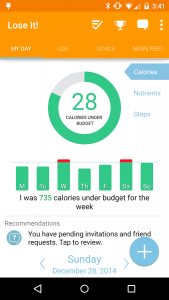Lose It!: Losing Weight and Gaining Guilt
One of the self-tracking apps I have on my phone is Lose It!, an app intended to help its user lose weight by tracking their food intake and their exercise. After the user inputs their desired weight loss targets, the app creates a daily calorie allowance, and counts all food and exercise either for or against it. At the end of the day, that day is either highlighted as red or green, depending on whether the calorie count was exceeded (bad, red) or not yet reached (good, green). The app also shows weekly trends and encourages the user to weigh-in regularly, to see if the goals are being met. This app requires regular, consistent use to work correctly; all food and all exercise must be put in without forgetting, which encourages the user to input information into the app after every meal or session at the gym. Optional information inputs include weigh-ins, body fat percentage, BMI, and other specific health calculations, but these are not required for the basic functions of the app. This app has the possibility to post to social media, but I do not allow it to do so because I don’t really need everyone in my life knowing how much I weigh or how often I exercise or eat pizza. The app itself encourages me to stay on track, and the privacy concerns of letting other people know this information outweigh any potential benefit I could get from doing so.
I could see this app being immediately helpful for those who want to lose weight, or even for those who for health reasons want to track their nutritional intake and exercise. The optional inputs allow for long-term usage that can help people see how their habits have impacted their health over time. Information from this app, if accurate, could also be used by health professionals to see if their patients are following through on doctor-given mandates, or just to track possible causes for the patients’ health issues.
I stopped using this app after several weeks, not because it was ineffective but because of how ashamed I felt if I didn’t meet the daily caloric requirements. Seeing that red bar affected me emotionally, and made me feel bad for going even 10 calories over what I was arbitrarily allowed by the app. The negative emotional impact of the app outweighed the small health benefits I was getting from it. To replace the work the app had done, I used a friend as an accountability partner, and we began going to the gym together. I don’t ever weigh myself (as I don’t really want to lose weight, I just want to be healthier), and I work out more frequently and with less stress.
In many cases, self-quantifying can be helpful, and providing that information to professionals might provide a more nuanced approach to all-around health. But in some cases, like mine, self-tracking has negative emotional externalities that aren’t often considered. It’s important in every individual’s case to think about what their priorities are, and balance those against the emotional and privacy concerns that self-quantifying might bring.

 Previous Post
Previous Post
I also used Lose It and I completely agree with your title to this post! And though the app doesn’t operate to shame people, don’t all life-tracking apps sort of guilt you if you don’t meet your goal? The Apple Watch buzzes if you’re not active enough, Map My Run can send you alerts if you aren’t running regularly, and Lost It will go red, literally, if you go over on calories. Also, Lose It can shame from multiple aspects as it sets an ideal ratio of carbohydrates, fats, and protein and if you don’t comply, you get an alert again. I wonder if, for some, this is motivating; seeing the red bar makes them work that much harder. For me, I did the not so healthy thing and would then under-eat the next day so my whole week summary was in the green. So, depending on personality, perhaps self-tracking apps are actually unhealthy.
This is a really interesting perspective on this app! It’s funny because I actually discussed the opposite view in my post-how MyFitnessPal (a different fitness app) is actually too neutral with its users. If we stay under the calorie count, it doesn’t give us any words of encouragement and if we go over the number, it doesn’t tell us to get ourselves back in gear. I think it would actually motivate me if the app was harsher with me, because I never really felt like I needed to improve my progress (even though I definitely was doing poorly). However, I think you made some extremely accurate points about it can be discouraging and have a negative emotional impact. Definitely a delicate balance to deal with in this digital world!
Interesting discussion here guys and thanks for the insight Brooke. I’m wondering if there’s a way for activity/food logs like these to detect what feedback best motivates the user. It seems like there’s a pretty big difference in how people are motivated. Perhaps Lose It and the likes can add some features to better motivate users.
Guilt and negative emotional impacts…a great point when it comes to the QS. This is especially interesting in comparison to the Etkins reading. Perhaps this app needs better motivational skills, as everyone else has said in their responses to your post! Good post!